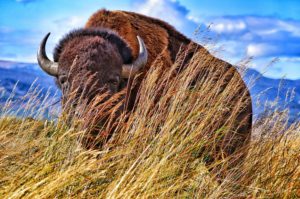Plant-Based Protein is Nothing New

(Photo by Jim Beauprez)
The newest trend in the food marketplace these days is “plant-based protein”. Among the thousands of exhibitors at the recent Natural Products Expo in Anaheim, CA were a crowded number of booths touting plant based proteins, and—in many cases—“plant-based meat.” Even traditional meat companies like Tyson are investing heavily in companies that are developing these plant-based “meats.”
Don’t get me wrong, I’m not against companies trying to artificially create some products out of textured wheat protein, leghemoglobin and konjac gum. Just don’t call it plant-based meat.
Meat already owns that title.
Labeling meat alternatives as plant-based meat seems to imply that meat—real meat—is based on something less than plants. That assumption is false, and the logic involved leads to an ecologically dangerous dead-end. Not only is meat plant-based, but most of the plants critical to the health of the soil, water and air are meat-based.
No one understands that better than bison producers working to maximize the symbiotic relationship of their herds and the grasslands.
The father of organic agriculture, Albert Howard, noted in 1945, “Never does Nature separate the animal and vegetable worlds. This is a mistake she cannot endure, and of all the errors which modern agriculture has committed this abandonment of mixed husbandry has been the most fatal.”
Responsible ranchers today live by this credo. Many ranchers refer to themselves as “grass-farmers.” One of the must-read periodicals in the grassfed livestock movement is the Stockman Grass Farmer.
Bison producers and other livestock ranchers use their animals to manage grass and other plants that grow in their pastures and rangelands. The manure that serves as fertilizer for the plants is only one aspect of grass-farming. Proper grazing stimulates healthy root systems that hold soil and sequester carbon. Hoof action stirs the soil and buries the seed. And—in the case of bison—wallowing creates depressions that help capture and retain valuable rainfall.
Pastures unbroken by a plow provide fertile habitat for prairie dogs, burrowing owls, rabbits, coyotes, and other animals. It all works together.
Cutting back on meat consumption may help reduce some of the environmentally damaging practices in agriculture. But removing meat animals from the food equation would result in an environmental disaster.
So, let’s get back to the basic concept behind “natural” food. In that sense, meat is the natural plant-based protein. Let’s come up with a different name for that meaty-tasting product manufactured in a processing plant from soybeans and leghemoglobin…whatever the heck that is.
P.S. The National Bison Association now owns the trademark to the term “Nature’s Original Plant-Based Protein®.” Any ideas on how we can put that to use? Email me at david@bisoncentral.com.
